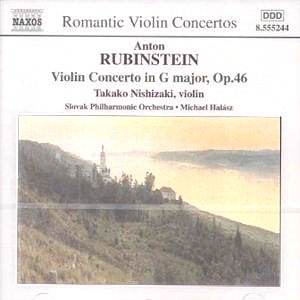Romantic Violin Concertos series
Anton RUBINSTEIN
(1829-1894)
Violin Concerto in G major, Op.46 (1857)
 Takako Nishizaki (violin);
Hong Kong Philharmonic, Kenneth Schermerhorn
Takako Nishizaki (violin);
Hong Kong Philharmonic, Kenneth Schermerhorn
Rec. Reduta, Bratislava, July 1985
César CUI (1835-1918)
Suite Concertante for violin and orchestra, Op.25 (1884)
 Takako Nishizaki (violin);
Slovak Philharmonic, Michael Halász
Takako Nishizaki (violin);
Slovak Philharmonic, Michael Halász
Rec. Tsuen Wan Town Hall, Hong Kong, 14th -17th October
1984
 NAXOS 8.555244
[58.35]
NAXOS 8.555244
[58.35]
Crotchet
AmazonUK
AmazonUS

RUBINSTEIN
Remembered as an outstanding pianist who rivalled Liszt, Rubinstein's abilities
as a composer are less well known. His compositions in general were not well
received by his Russian contemporaries, possibly because he moved away from
the accepted nationalistic style and adopted the traditions of the German
school. As the son of German-Jewish parents who had chosen to become Christians
he shared with Mendelssohn a similar background.
His Violin Concerto is an elegant work full of energy and with strong
dialogue existing between orchestra and soloist. Despite his critics, Rubinstein
shows he has a fine command of structure, and his orchestration is as well
crafted as Mendelssohn and his contemporaries.
An elegant and attractive opening to the first movement holds a promise of
good things to come and anticipates a fine concerto. Certainly the work is
as fluent as those masters of concerto writing. But for me, the development
in the second and third movements loses some of the initial momentum and
the staves seem to drift aimlessly by. (Tchaikovsky's critics who condemned
his ballet-like symphonies would certainly agree with this.)
CUI
Cui follows the main Russian nationalist composers who all composed whilst
continuing to work at mainstream jobs. Cui, much in keeping with his background
as a son of a French army officer, was an expert on military fortifications.
He furthered his musical interests in St. Petersburg where he was studying
military engineering. Interestingly, Cui was one of the critics of Rubinstein
and Tchaikovsky and promoted the Russian ideals in music. He wrote songs,
piano pieces, choral works and orchestral pieces yet shied away from symphonic
writing. Few of these works have been recorded, however.
Cui's Suite Concertante like Rubinstein's work is a well-constructed
work full of contrasts and demonstrates this composer's good command of
structure, and orchestration. The work also exists as a piece for violin
and piano.
The Intermezzo's brief orchestral introduction followed by
solo violin in Russian gypsy mood that bounces along to a sharp unprecedented
close. Then follows a nomadic and flowing movement which meanders with a
hint of Smetana's Moldau before returning to the opening gypsy theme.
The waltz theme introduced at the end is unusual and although pleasant it
seems out of place. The Canzonetta is a modern sounding movement that
could have been a model of the valse movement in Coates' 'Four
Centuries' suite. The Cavatina is a rich, well-structured lyrical
movement punctuated by bright woodwind phrases. In contrast, the
Tarantella returns briefly to the dark gypsy theme before snapping
its bonds and releasing us into a Tchaikovsky-like theme that takes us to
a brief orchestral finale.
In both performances a highly accomplished Takako Nishizaki plays the violin
with much energy and feeling. Likewise, the orchestras play with competence.
The fine recordings are well balanced with the soloist forward focused yet
not so prominently as to lose the interesting orchestral detail. These two
recordings were previously issued on Marco Polo and are now given a further
lease of life under the cheaper Naxos label.
The CD gives us an opportunity to compare two Russian composers who are
separately attempting to promote the German and Russian schools of music
tradition. The compositions are placed 27 years apart, with Cui's work being
written long after the criticism of Rubinstein's adoption of the German style.
The listener will probably consider Cui's initial commitment to the Russian
school somewhat waning.
Raymond Walker

